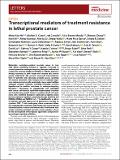Transcriptional mediators of treatment resistance in lethal prostate cancer
Author(s)
He, Meng Xiao; Cuoco, Michael S.; Crowdis, Jett; Bosma-Moody, Alice; Zhang, Zhenwei; Bi, Kevin; Kanodia, Abhay; Su, Mei-Ju; Ku, Sheng-Yu; Garcia, Maria Mica; Sweet, Amalia R.; Rodman, Christopher; DelloStritto, Laura; Silver, Rebecca; Steinharter, John; Shah, Parin; Izar, Benjamin; Walk, Nathan C.; Burke, Kelly P.; Bakouny, Ziad; Tewari, Alok K.; Liu, David; Camp, Sabrina Y.; Vokes, Natalie I.; Salari, Keyan; Park, Jihye; Vigneau, Sébastien; Fong, Lawrence; Russo, Joshua W.; Yuan, Xin; Balk, Steven P.; Beltran, Himisha; Rozenblatt-Rosen, Orit; Regev, Aviv; Rotem, Asaf; Taplin, Mary-Ellen; Van Allen, Eliezer M.; ... Show more Show less
DownloadPublished version (7.864Mb)
Publisher with Creative Commons License
Publisher with Creative Commons License
Creative Commons Attribution
Terms of use
Metadata
Show full item recordAbstract
© 2021, The Author(s). Metastatic castration-resistant prostate cancer is typically lethal, exhibiting intrinsic or acquired resistance to second-generation androgen-targeting therapies and minimal response to immune checkpoint inhibitors1. Cellular programs driving resistance in both cancer and immune cells remain poorly understood. We present single-cell transcriptomes from 14 patients with advanced prostate cancer, spanning all common metastatic sites. Irrespective of treatment exposure, adenocarcinoma cells pervasively coexpressed multiple androgen receptor isoforms, including truncated isoforms hypothesized to mediate resistance to androgen-targeting therapies2,3. Resistance to enzalutamide was associated with cancer cell–intrinsic epithelial–mesenchymal transition and transforming growth factor-β signaling. Small cell carcinoma cells exhibited divergent expression programs driven by transcriptional regulators promoting lineage plasticity and HOXB5, HOXB6 and NR1D2 (refs. 4–6). Additionally, a subset of patients had high expression of dysfunction markers on cytotoxic CD8+ T cells undergoing clonal expansion following enzalutamide treatment. Collectively, the transcriptional characterization of cancer and immune cells from human metastatic castration-resistant prostate cancer provides a basis for the development of therapeutic approaches complementing androgen signaling inhibition.
Date issued
2021-03Department
Massachusetts Institute of Technology. Department of Biology; Howard Hughes Medical Institute; Koch Institute for Integrative Cancer Research at MITJournal
Nature Medicine
Publisher
Springer Science and Business Media LLC
ISSN
1078-8956
1546-170X